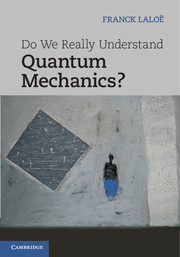Book contents
- Frontmatter
- Contents
- Foreword
- Preface
- 1 Historical perspective
- 2 Present situation, remaining conceptual difficulties
- 3 The theorem of Einstein, Podolsky, and Rosen
- 4 Bell theorem
- 5 More theorems
- 6 Quantum entanglement
- 7 Applications of quantum entanglement
- 8 Quantum measurement
- 9 Experiments: quantum reduction seen in real time
- 10 Various interpretations
- 11 Annex: Basic mathematical tools of quantum mechanics
- Appendix A Mental content of the state vector
- Appendix B Bell inequalities in non-deterministic local theories
- Appendix C An attempt for constructing a “separable” quantum theory (non-deterministic but local)
- Appendix D Maximal probability for a state
- Appendix E The influence of pair selection
- Appendix F Impossibility of superluminal communication
- Appendix G Quantum measurements at different times
- Appendix H Manipulating and preparing additional variables
- Appendix I Correlations in Bohmian theory
- Appendix J Models for spontaneous reduction of the state vector
- Appendix K Consistent families of histories
- References
- Index
1 - Historical perspective
Published online by Cambridge University Press: 05 September 2012
- Frontmatter
- Contents
- Foreword
- Preface
- 1 Historical perspective
- 2 Present situation, remaining conceptual difficulties
- 3 The theorem of Einstein, Podolsky, and Rosen
- 4 Bell theorem
- 5 More theorems
- 6 Quantum entanglement
- 7 Applications of quantum entanglement
- 8 Quantum measurement
- 9 Experiments: quantum reduction seen in real time
- 10 Various interpretations
- 11 Annex: Basic mathematical tools of quantum mechanics
- Appendix A Mental content of the state vector
- Appendix B Bell inequalities in non-deterministic local theories
- Appendix C An attempt for constructing a “separable” quantum theory (non-deterministic but local)
- Appendix D Maximal probability for a state
- Appendix E The influence of pair selection
- Appendix F Impossibility of superluminal communication
- Appendix G Quantum measurements at different times
- Appendix H Manipulating and preparing additional variables
- Appendix I Correlations in Bohmian theory
- Appendix J Models for spontaneous reduction of the state vector
- Appendix K Consistent families of histories
- References
- Index
Summary
The founding fathers of quantum mechanics had already perceived the essence of the difficulties of quantum mechanics; today, after almost a century, the discussions are still lively and, if some very interesting new aspects have emerged, at a deeper level the questions have not changed so much. What is more recent, nevertheless, is a general change of attitude among physicists: until about 1970 or 1980, most physicists thought that the essential questions had been settled, and that “Bohr was right and proved his opponents to be wrong”. This was probably a consequence of the famous discussions between Bohr, Einstein, Schrödinger, Heisenberg, Pauli, de Broglie, and others (in particular at the Solvay meetings [1–3], where Bohr's point of view had successfully resisted Einstein's extremely clever attacks). The majority of physicists did not know the details of the arguments. They nevertheless thought that the standard “Copenhagen interpretation” had clearly emerged from the infancy of quantum mechanics as the only sensible attitude for good scientists. This interpretation includes the idea that modern physics must contain indeterminacy as an essential ingredient: it is fundamentally impossible to predict the outcome of single microscopical events; it is impossible to go beyond the formalism of the wave function (or its generalization, the state vector ∣ψ) and complete it.
- Type
- Chapter
- Information
- Do We Really Understand Quantum Mechanics? , pp. 1 - 16Publisher: Cambridge University PressPrint publication year: 2012



